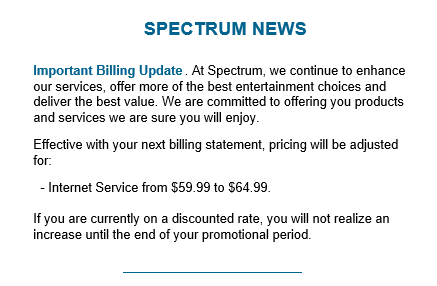 Time Warner Cable and Bright House Networks customers are now getting a taste of the frustration that original Charter Communications customers have experienced for years in dealing with the company’s complicated TV packages.
Time Warner Cable and Bright House Networks customers are now getting a taste of the frustration that original Charter Communications customers have experienced for years in dealing with the company’s complicated TV packages.
Sheila Topmiller in northern Kentucky wasn’t the only former Time Warner Cable customer to see her bill spike after Charter took over and rolled out its new Spectrum TV packages. Her bill increased from $152 to $180 a month — a $28 rate increase. Her triple-play TV lineup had to change, along with her bill.
One of the highlighted points Charter executives told Wall Street and investors regarding its acquisition of Time Warner Cable and Bright House Networks was that Charter’s “simplified pricing” and crackdown on promotions would result in higher average revenue from customers over time. The reasons are simple: fewer value-priced broadband options, illusory TV channel “choice” in packages designed to compel customer upgrades, higher phone pricing, and no more deals for complaining customers.
TV packages are supposed to offer customers at least the illusion of choice, giving options to cut down a TV package in return for a lower bill. But cable operators like Charter Communications are savvy enough to know what channels are considered “must-have” by customers, and can move networks from one tier to another with little notice. This can force subscribers to upgrade to get back channels stripped from their current package. Now Time Warner Cable customers shifting to Spectrum packages are discovering six popular Viacom-owned channels Nickelodeon, MTV, VH-1, Spike, BET, and Comedy Central are only included in the most expensive tier.
Just a year ago, these six networks were commonly found as part of Charter’s cheapest “Select” TV tier. But new customers found them transitioned first to the Silver tier, and finally to Charter’s most expensive “Gold” package. Existing Charter customers may not have noticed because the networks were often grandfathered into their current package, but ex-Time Warner Cable customers like Topmiller did. She has kids, and Nickelodeon is considered a “must-have” network in her home.
“You have to subscribe all the way to the highest plan to get Nickelodeon,” she complained.
This isn’t the first time channels have been shifted from one package to another, and Charter is not the only cable operator following this practice. In 2012, Comcast got a lot of heat for moving the popular commercial-free Turner Classic Movies from its Digital Starter package to its much more expensive Digital Preferred tier. Customers that wanted TCM back had to pay an extra $22 a month for the upgrade.
Time Warner Cable had its own tiers, but incentivized most customers through bundles and promotions to take its Preferred TV package that bundled Starter, Standard and Variety Pass options together. Time Warner Cable also didn’t bundle premium movie channels into TV packages the way Charter does. Charter’s Silver package, as well as adding basic networks, also bundles HBO, Cinemax, and Showtime. Upgrading to Gold to win back those six Viacom basic networks also gets you the aforementioned premium movie channels plus Starz, TMC, Starz/Encore, Epix, and NFL RedZone. For many customers, Gold is aptly named because it results in a considerably higher bill unless a customer already subscribed to most or all of the available premium networks through Time Warner Cable or Bright House Networks in the past.
To boost revenue, a cable operator need only shift popular cable networks into higher-priced tiers and watch customers follow.
 Charter Communications may sell you a Silver or Gold package to restore your old lineup, but there is a better way to get channels back without spending money on premium movie channels you may not want.
Charter Communications may sell you a Silver or Gold package to restore your old lineup, but there is a better way to get channels back without spending money on premium movie channels you may not want.
Spectrum quietly offers two “digi-pack” options to customers who balk at paying for HBO and other premium networks:
- Digi-pack 1 ($12) gives you access to all Silver-level basic cable networks, but no premium movie channels;
- Digi-pack 2 ($12) gives you access to all Gold-level basic cable networks, but no premium movie channels.
But Charter representatives still claim its TV package “simplification” and new pricing is good for customers.
“It’s actually less money when you factor in there is no modem fee. No data caps, no contract to sign, no modem fees,” said Charter (and former Time Warner Cable) spokesman Mike Pedelty. He doesn’t mention customers could buy their own modems and avoid Time Warner Cable’s modem fees, and Charter’s predecessor also had no data caps or contracts to sign.


 Subscribe
Subscribe

 “Our work suggests that cable companies have room to take up broadband pricing significantly and we believe regulators should not oppose the re-pricing (it is good for competition & investment).”
“Our work suggests that cable companies have room to take up broadband pricing significantly and we believe regulators should not oppose the re-pricing (it is good for competition & investment).” The last remaining parts of the country formerly served by Time Warner Cable are rebranding as Charter/Spectrum today, with the introduction of new service plans in upstate New York, western Massachusetts, Maine, and parts of the Carolinas.
The last remaining parts of the country formerly served by Time Warner Cable are rebranding as Charter/Spectrum today, with the introduction of new service plans in upstate New York, western Massachusetts, Maine, and parts of the Carolinas. It isn’t known how many other Tampa area customers were also overbilled or if Charter was working to identify and refund those who did not pursue a complaint with a local television newscast.
It isn’t known how many other Tampa area customers were also overbilled or if Charter was working to identify and refund those who did not pursue a complaint with a local television newscast.
 Suddenlink customers around the country are finding accessing the internet has suddenly gotten more expensive. For many service areas, the cable operator raised its rates in December for television and broadband service, with some of the biggest hikes coming from sneaky surcharges.
Suddenlink customers around the country are finding accessing the internet has suddenly gotten more expensive. For many service areas, the cable operator raised its rates in December for television and broadband service, with some of the biggest hikes coming from sneaky surcharges. “They also had their artificial internet rate hike when they implemented data ‘allowances’ (caps),” retorted Ryan, a Suddenlink customer. “Their upgrades are anything but complimentary.”
“They also had their artificial internet rate hike when they implemented data ‘allowances’ (caps),” retorted Ryan, a Suddenlink customer. “Their upgrades are anything but complimentary.”